Fed, speak softly and carry a big stick — you will go far
The Fed holds the keys to the global economy, and must choose its words more carefully. Its large, rapid rate hikes have made financial markets fragile. Words matter.
The Fed must get its communication policy under control. Financial markets, more than ever, need clarity, not confusion. Last Friday was the first day out of the FOMC meeting blackout, with four Fed officials speaking in public. Their words whipped markets around all day. That’s unacceptable and dangerous.
Today’s post shares some real-time headlines. Remember, the judge of communication policy is what the audience hears, not what the Fed wants them to hear.
Tom Barkin (non-voting until 2024)
First, Tom Barkin, the President of the Federal Reserve Bank of Richmond, on CNBC:

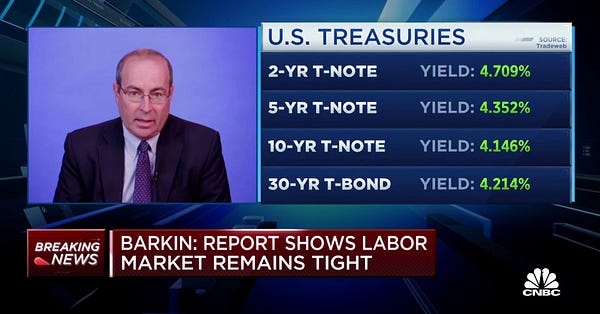

Barkin, throughout the interview, could be interpreted in myriad ways. That causes uncertainty. Here’s what Fed Chair Jay Powell said two days earlier at the FOMC press conference about how high the Fed would raise the federal funds rates, referred to as the “terminal rate.”
CHAIR POWELL. … how high to raise our policy rate, and we're saying that we'd raise that rate to a level that's sufficiently restrictive to bring inflation to our 2 percent target over time and we put that into our post-meeting statement because that really does become the important question we think now, is how far to go and I'll talk more about that. We think there's some ground to cover but before we meet that test and that's why we say that ongoing rate increases will be appropriate, and as I mentioned, incoming data between the meetings, both a strong labor market report but particularly the CPI report, do suggest to me that we may ultimately move to higher levels than we thought at the time of the September meeting. [The median forecast from participants for the peak rate then was 4.6%.] That level is very uncertain though, and I would say we're going to find it over time.
Listen to Powell. He and he alone speaks for the FOMC.
Moreover, no one on the FOMC, including Barkin or Powell, should be giving numeric guidance. The Fed says it’s data-dependent. There is an incredible amount of data coming. In addition, 5% is a special number since it is the market’s consensus forecast for the terminal rate. It is not the Fed’s job to confirm Goldman’s forecast. Lastly, keep in mind that Barkin is not voting on monetary policy this year or next.
Susan Collins (voting through December)
Next, Susan Collins, the Federal Reserve Bank President of Boston, spoke at the Brookings Institution.


“In my [Collins’] view …” Again, Powell is the only person who speaks for the FOMC. Every other Fed official shares their own opinion. It’s essential to debate around the FOMC table; it’s problematic in public, especially with fragile markets. Unlike the other three Fed officials who spoke on Friday, Collins is a voting member. She has one more vote to cast, one of 12 FOMC members.
Prepared, vetted speeches are a controlled way to reinforce messages from Powell and the FOMC. The informal Q&As, as Collins’ with David Wessel, are riskier:

Why are Collins and other Fed officials doing quick takes on wage [average hourly earnings] data that the Bureau of Labor Statistics published just hours before? Wage growth is central to the Fed’s current rate policy, and individuals should be cautious in how they discuss it in real time. Markets react to such comments in ways that could work against the Fed’s goals, especially if it creates more fragility.
Charlie Evans (non-voting, retires early 2023)
Charlie Evans, the Federal Reserve Bank President of Chicago, spoke with Reuters. The following three tweets show that the messages can be interpreted differently, even from one official in one interview.

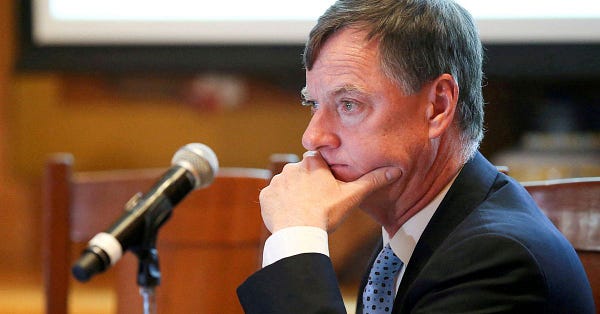

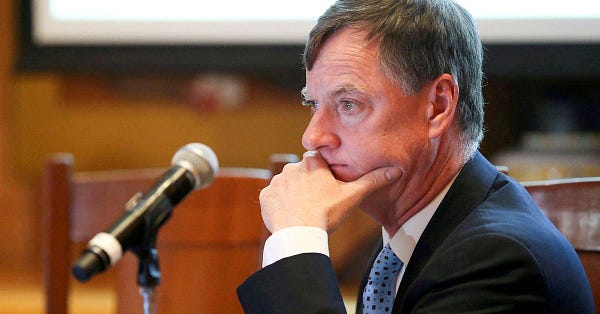
Markets broadly read Evans as dovish: front loading is done, and it’s time to slow to 50 basis point increases. However, some picked up on the terminal rate above 5%. That may be his opinion, but he has no vote and retires early next year.
Also, let’s go back to Powell at the FOMC press conference:
… at some point it will become appropriate to slow the pace of increases. So that time is coming, and it may come as soon as the next meeting or the one after that. No decision has been made. It is likely we'll have a discussion about this at the next meeting, a discussion. To be clear, let me say again, the question of when to moderate the pace of increases is now much less important than the question of how high to raise rates and how long to keep monetary policy restricted, which really will be our principal focus.
A “discussion at the next meeting.” Nothing suggests that frontloading is done. We have weeks before that meeting. Fed officials following Powell in two days with direct contradictions in public is confusing and, for non-voting members, pointless.
Neel Kashari (voting in 2023)
Last up on Friday was Neel Kashkari, President of the Federal Reserve Bank of Minneapolis, who spoke with the Associated Press:


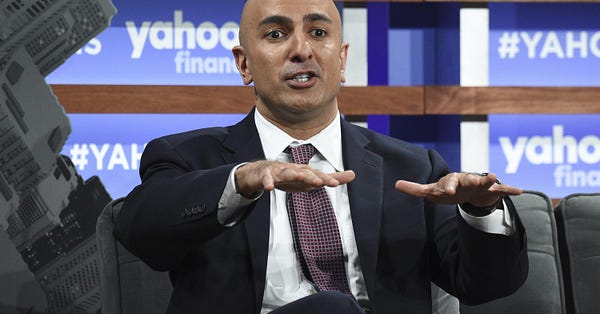
Again, more chatter on Jobs Day. There are two CPI reports and one more Jobs Day before the December vote. Why make such bold predictions now? Be data-driven; all data. Kashkari is a voting member next year when the Fed will presumably reach its terminal rate. His words can be especially unsettling to markets now.
Wrapping up
Last Friday was an overload of Fed. It was risky and counterproductive.
Financial markets are too fragile to absorb that much Fedspeak in one day, especially when contradictory and confusing. The stock market whipped around as Fed officials spoke. Directly after an FOMC meeting. Fed officials should not be rushing out to stake their personal opinions.
I do not want to silence anyone. We need robust debate. I am simply asking on behalf of the world and financial markets that the Fed choose its words more carefully. It must communicate clearly and strategically as an institution. Let Powell deliver and control the message, as he said at the presser:
We have a ways to go. And the last thing I'll say is that I would want people to understand our commitment to getting this done. And to not making the mistake of not doing enough or the mistake of withdrawing our strong policy and doing that too soon. So those, I control those messages and that's my job.
And it’s time to stop raising rates. Otherwise, the Fed will break something.
Addendum:
Fed officials will continue to chatter. So, here's who to listen to:
1) FOMC statement + Powell presser (together!)
2) Powell's speeches
3) Brainard's speeches
That's it unless you have a very good Fedspeak decoder ring. If you can't help yourself and want to watch Fedspeak 24-7, then largely ignore non-voters.

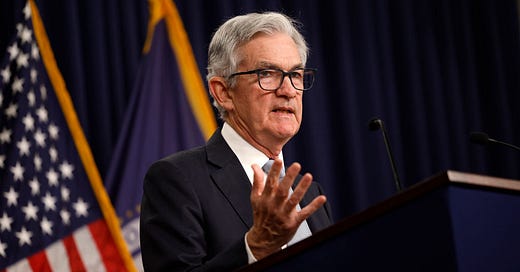




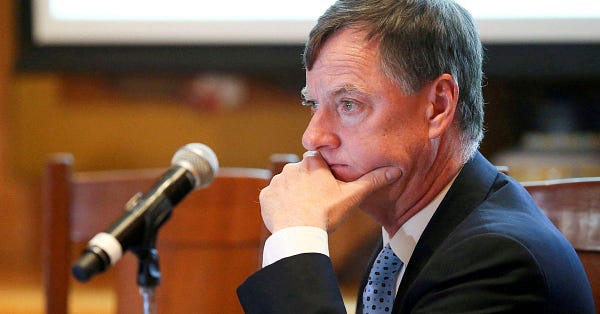
First, a couple of thoughts:
1) People are confused identifying official Fed Res information sources, due to the ambiguous nature of the 1913 Fed Res Act’s characterization of the independent Federal Reserve System of Banks vis-a-vis The Board of Governors of the Fed Res. One arguably straddles between Private and Public, the other is squarely a Quasi-Governmental Agency, with all the mandates that this implies. The Quasi-Agency Board of Governor’s Chairman clearly has fiduciary duty to American and its affiliates, I do not know if that includes Non-Bank Presidents, Board of Gov’s vice-chairs such as Brainard.
2) The information that leaves the Fed Reserve, via its Banks, or Board of Governors has ‘Left the Building’, if you will, and its too late to get involved with Market Forces that this information may ignite.
———
More generally, the organizational problem of handling periodic, dynamic, sensitive information dumps & flows, by The Board of Governors, that we know will be leveraged as triggers to actions by millions of people, driving trillion’s of dollars of investment & policy decisions across the international community per year—one would think, that there would be a well thought-out, refined, monitored process, that clears up such ambiguity, and considers the risk-level implications of potentially unintended information leaks; opportunities for information misinterpretation/misuse in the media; and an assortment of inequitable information cul-de-sacs that may form.
To my knowledge, there is no broad robust security/confidentiality policy in the Quasi-Agency Space(I may be wrong), which dictates and constrains how relevant/sensitive information must be handled in the course of the operation of the US Government (and Quasi-Governmental Agencies like the Board of Governors of the US Federal Reserve Banking System) in 2022.
Beyond the Quasi-organization, such types of information handling issues have been of concern in the news in recent years while having come to the attention of officials in several areas of the US Government (The WH, the Supreme Court, & who knows how many other incidences that we are just not aware of). The American way of just “winging it” may no longer be working for us, in this day of increasing technological sophistication.
At IBM, a Company who’s enduring mandala/moniker “THINK”, since 1914, implied a basis for many branches of its management style over the years through the 20th century and is still relevant today: 1) The value of IBM’s Intellectual Property Assets, normally invested-in & developed within the firm, were key to its future technological competitive advantages; 2) A security system of controls for Supplier/Customer/Internal-Use documents, development-products/technologies, and tool-modeling plans/process handling, that were graduated by established ‘needs to know’ protocols, multilevel management reviews, and in parallel, an employee/contractor education program as part of employee’s individual Professional Development coursework.
Roughly speaking, such communicated “asset” security planning & protocols need to be sewn into every sensitive area of the US Government today in order to protect The People’s future assets and security/safety. Eg, In any one given Speech(or Tweet), The US Presidency has been leaking(indirectly/directly) information, at the very least, of our ‘intent’(and much more) for 6 yrs now. The dam has holes, and the dam is ready to go.
Summary: Claudia’s concern with The Federal Reserve Bank’s management of ‘outsider’ financial expectations is at least as important a part of the day-to-day business that any other agency of the government handles during the year.
The especially concerning information-messaging by the Fed Reserve that some have observed during these high inflationary times, I believe, is stemming from a much broader problem which includes the integration of super-timely, high-speed/high-volume & quality, rapid-message-proliferation technologies, driven by a set of advancing tech-tools that are clearly well beyond the capacity of our antiquated traditional managerial communication paths to handle safely/effectively while attempting to preserve the security of “mis-intended consequences” of original sources/sinks of our most vital information flows today.
Signed - Joe Citizen X
It seems to me that any speculation of what future instrument settings will be are inappropriate. Changes in Instrument setting are supposed to be based on data. I'd rather hear the Chairman say how the partial derivative of a target variable wrt to an instrument variable has changed in their revised estimate.
And of course to ask the Treasury to please crated some intermediate tenor TIIPS.